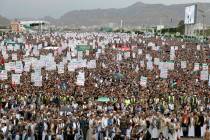Yucca Mountain cost estimate tops $90 billion
WASHINGTON -- The projected costs to build a nuclear waste repository at Yucca Mountain, ship used radioactive fuel to Nevada from around the country and operate the site for 100 years have grown to more than $90 billion, an energy department official said Tuesday.
Ward Sproat, director of the Department of Energy's Office of Civilian Radioactive Management, said the department will detail its new cost estimate in a report to be released in the next several weeks.
The department's previous "total system life cycle" cost estimate for the repository was $57.6 billion, set in 2001. Since that time, the project schedule repeatedly has been pushed back and some of its key elements are being redesigned.
Sproat, who spoke to reporters after testifying before a House energy subcommittee, said the increased costs were due also in part to inflation and DOE assumptions that the Nevada site at some point will be expanded.
A second report the energy department is preparing to make public will renew a recommendation that Congress eliminate a 70,000-metric-ton cap on how much nuclear waste can be placed within a Yucca repository.
The department believes the mountain site 100 miles northwest of Las Vegas could hold at least twice as much nuclear waste, Sproat said, while industry-funded studies have concluded the Yucca capacity could be expanded by three or four times.
Sproat said a third report will conclude that there is no need to raise the fee that the department charges utilities to fund the Yucca Mountain project.
The charge, which is passed on to consumers, is one-tenth of one cent per kilowatt hour of electricity. Since 1983, charge revenues have built a fund that today contains $21 billion, the total after the department spent $9 billion.
Sproat testified to members of the House energy and air quality subcommittee that was seeking an update in light of DOE submitting a construction application to the Nuclear Regulatory Commission in June.
Sproat said DOE "turned the corner on the Yucca Mountain program" when it filed its application.
He used the achievement as a selling point for Congress to reconsider bills that would make more money available for repository construction and address DOE needs for water and land withdrawals in Nevada.
Questions surrounding radioactive waste disposal long have been an impediment to the development of more nuclear plants, Sproat contended.
But with the project now under review by the regulatory commission, "we are three to four years away from answering the questions and putting them to bed finally," Sproat said.
Commission officials have said they hope to complete a license review in three or four years. Even so, it would take almost a decade more, under DOE's best-case scenarios for a repository, to open Yucca Mountain for business, with some experts predicting delays even years longer than that.
Most members of the energy and air quality subcommittee generally have been supportive of the Yucca project. With lawmakers feeling pressure from constituents on energy prices, several panelists said DOE cannot move fast enough to complete Yucca Mountain.
"For the sake of the country we need a safe, secure repository that can be safeguarded and where America's nuclear waste can go, the sooner the better," said Rep. Greg Walden, R-Ore.
Rep. Shelley Berkley, D-Nev., urged colleagues to reconsider. She said there are unresolved issues at Yucca Mountain, including unfinished designs for nuclear waste canisters, the lack of a federal radiation safety standard, and questions about whether the site could withstand earthquakes and volcanoes.
Berkley said it was not too late for Congress to decide to keep nuclear waste stored at current power plant locations until other disposal methods can be developed.
Contact Stephens Washington Bureau Chief Steve Tetreault at stetreault@stephensmedia.com or 202-783-1760.




















